“They Don’t Trust Us”: Nevada Election Workers Still Face Pressure and Harassment
Nevada’s new secretary of state, who defeated a prominent election denier in November, tells Bolts that his priority will be to step up protections for election workers.
Alex Burness | February 7, 2023


Election administration used to take up a fraction of Lacey Donaldson’s headspace. “An every-two-years kind of thing,” she said. But these days, Donaldson, the elected clerk and treasurer of Pershing County, Nevada, can hardly run an errand without being reminded of how much has changed since 2020 for elections professionals like her.
“It’s not just people questioning you at work. It’s at the grocery store, or at your niece’s birthday party,” she said. Her county covers an area almost as big as New Jersey but has a population of just over 6,700 people.
“I pretty much know everyone,” added Donaldson, a Democrat starting her fourth term in a county then-President Donald Trump won by 51 points in 2020. “They don’t trust us. We’re letting them watch the process, but you can’t really argue with those people that have believed misinformation. It doesn’t matter how long they’ve known you. They’ll say, we know you’re doing it the right way, but the county next door isn’t. Well, that doesn’t make you feel any better about your job.”
This relatively new stressor is part of the long tail of election denialism that was kicked off by Trump during the 2020 presidential election. It remains as an animating belief among some on the right that entire electoral systems—and the people who run them—are irredeemably untrustworthy.
The constant harassment has been enough to force many in Donaldson’s field out of the profession. A 2021 Brennan Center national survey of election workers found that a third had been made to feel unsafe because of their work, while about one in six said they’d been outright threatened during the past election cycle.
In Nevada, it’s been felt acutely. The clerk of Washoe County (Reno), the second most populous county in the state, stepped down last year amid threats to herself and her office. The clerk of rural, deep-red Nye County also stepped down, because commissioners there voted to conduct ballot-counting by hand, and was replaced by a new clerk who has promoted election conspiracies. Clerks in tiny Lander and Mineral counties both resigned in late 2021.
Amid that turmoil last year, Nevada became a focal point for far-right efforts to overtake election administration. Jim Marchant, a Trump-endorsed election denier who echoed Nye County officials’ conspiracies against voting machines, ran for secretary of state in Nevada, while also taking a lead in coordinating a national slate of election deniers to run for the position in critical battleground states. Most lost in November, including Marchant.
Despite Marchant’s loss, these pressures have still left election administration in Nevada in a challenging position. Now, about 40 percent of county clerks in the state are either brand new to their offices or, having taken over mid-term for a departed clerk, are serving their first complete terms. Some have never worked in elections before.
The man who beat Marchant, Democratic Secretary of State Cisco Aguilar, has also never worked in elections. In an interview with Bolts last week, he indicated that he was getting up to speed on important questions about voting access for Native communities; engagement of eligible voters newly released from prison; and potential improvements to the state’s automatic voter registration system.
“The biggest challenge” Nevada faces, Aguilar said, is building and preserving a robust, institutionally knowledgeable elections workforce.
“Making sure we have people wanting to work in election departments, people wanting to work at the polls,” he said. “If we don’t take care of the human component, these elections are going to be nowhere near where we want them to be or expect them to be, and that’s only going to deteriorate the credibility of elections overall.”
Nevada, like other states, has three major elections—presidential primary, general election primary and general election—in 2024.
“If people don’t feel safe going to work, they’re not going to work in these departments or on the polling sites,” Aguilar added.


Nonpartisan national elections experts generally rate Nevada’s voting systems above those of other states. It has in recent years distinguished itself from most of the rest of the country by offering universal, automatic mail voting; by implementing a modernized version of automatic voter registration; and by allowing same-day registration—among other policies.
But workforce problems this state faces present a different type of challenge to election integrity that can’t be solved with voting procedure innovations alone.
Aguilar is working to implement—ideally in time for 2024 elections, he said—a program that will take substantial administrative burden off of local election officials by centralizing the state’s voter registration information in a single database his office would maintain. At present, county offices must maintain their own databases and report up to the state, an arrangement which Donaldson, president of the Nevada Association of County Clerks and Election Officials said “we all have issues with.” Aguilar asked the legislature for $30 million to do this. So far the new governor, Republican Joe Lombardo, has supported the ask, Aguilar says.
The new secretary of state is also backing at least two new proposed laws this legislative session meant to protect election workers. One, Assembly Bill 59, would allow state election officials to shield their home addresses from public records; the other, expected but not yet filed, would make it a felony to threaten, harass or intimidate election workers.
These proposals roughly mirror policies to discourage and punish harassment of election workers in other states, including Washington, Maine, and Colorado. These new laws have passed with bipartisan support, though advocates against mass criminalization have cautioned against the suggestion that new or harsher criminal penalties are appropriate solutions.
States Newsroom reported last year that in Washington, for example, the ACLU opposed a new law calling for up to five years of prison time in some cases, on the grounds that the state’s criminal code already allows for punishment of harassment—regardless of whether a victim is an election worker. And in Maine, criminal defense attorneys pointed to the fact that existing criminal penalties often do not actually deter criminal behavior.
Kerry Durmick, Nevada state director for the nonprofit voting rights group All Voting is Local, said they are skeptical of the proposal to increase criminal penalties.
“I’m not going to come out on this particular bill until we see the language,” Durmick said. “We don’t want it to go too far and have the effect of intimidating voters, or have a negative effect on criminal justice by creating a new felony. But we do want to protect election workers.”
Aguilar is convinced his policies are on target because, he said, similar ones in Colorado and other states are working. Matt Crane, who directs Colorado’s association of county clerks, said it’s not yet clear whether that is true. His state’s law only went into effect in June.
“I think it gives people some comfort knowing they’re protected. I think it’s too early to say how much,” he told Bolts. He added that the pressures on election officials that inspired the Colorado and Nevada legislation have died down a bit lately, but “there’s no question, with [Arizona’s losing gubernatorial candidate] Kari Lake running around with her absurdity, with Trump running for president, this stuff isn’t going to go away.”
Donaldson said she and other clerks in the state are on board with Aguilar’s agenda, and especially the new statewide registration database, but that she’s not sure legislation alone can cure what ails her profession. After all, she noted, no statehouse bill would extinguish misinformation, or seek to regulate the freedom of her constituents to bark at her in the grocery store.
“I don’t have that answer,” Donaldson added. “It’s hard because we try, with the help from the secretary of state’s office, to put out the correct information, but how do you make people believe it? I don’t know how we could do better at those kinds of things.”
She worries this trend will be especially taxing in rural communities, where misinformation and harassment are less often abstract or faceless because they come straight from neighbors. Her county, Pershing, is the type where multiple generations have been taught by the same local school teachers.
“It’s easier to ignore when you don’t know them,” Donaldson said. “But it’s every day now. It becomes a lot.”

